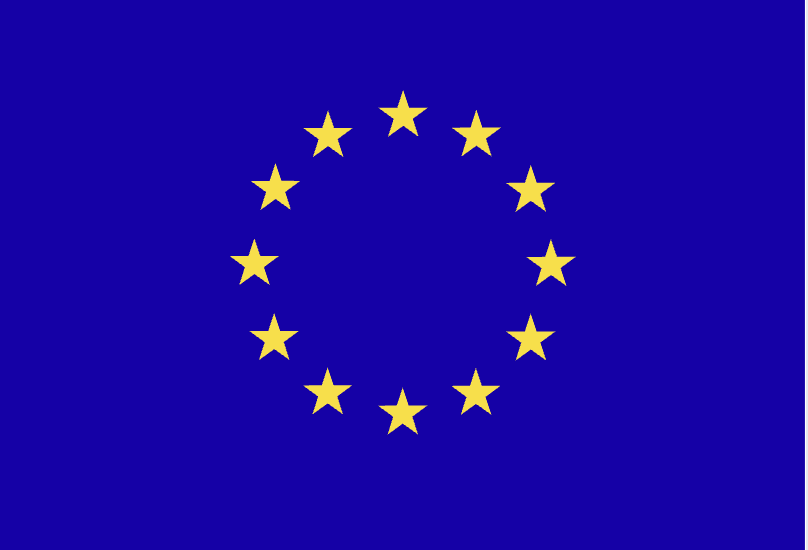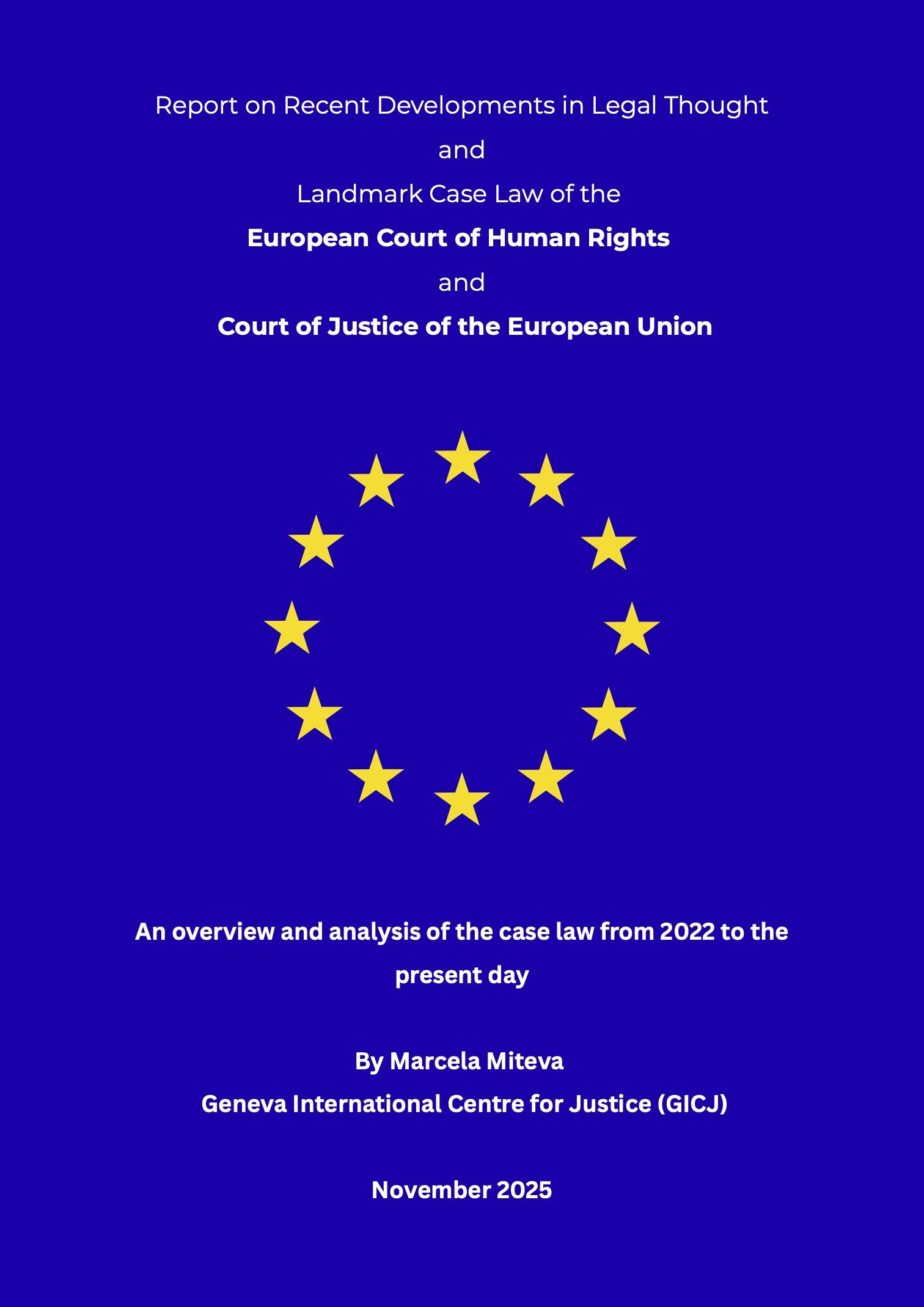
Report on Recent Developments in Legal Thought and Landmark Case Law of the European Court of Human Rights and the Court of Justice of the European Union
By Marcela Miteva / GICJ
The European Court of Human Rights (ECtHR) and the Court of Justice of the European Union (CJEU) case laws are having a conclusive impact on advancing the understanding of the concept of fundamental rights in the European Union legal framework. This report examines the important judicial milestones since the year 2022 until today, which will help in uncovering new paradigms of judicial deliberation in respect of the enlargement or reduction of fundamental human rights protected under the European Convention of Human Rights (ECHR) and the Charter of the Fundamental Rights of the European Union (CFREU). These judicial decisions are mainly categorised under the headings of environment, migration/asylum, and freedom of expression & technologies.
Environmental precedents and Climate change
Precedents in Environmental Contingencies vs. a major precedent in environmental rights was set by the ECtHR in the decision of Verein KlimaSeniorinnen Schweiz and Others vs. Switzerland of the 9th of April of the year 2024 in the case of Verein KlimaSeniorinnen Schweiz and Others vs. Switzerland [GC]. This important decision of the ECtHR is the first one to set three criteria under which environmental associations can gainsay the issue of locus standi in order to represent individuals under a state’s refusal to reduce any negative effects that climate change has upon a certain state. This group of individuals claimed that the Swiss government breached the positive obligation of Article 2 (Right to Life) in conjunction with Article 8 (Private Life).
However, "climate change litigation is a transnational phenomenon that presents a challenge distinct from traditional litigation involving single-source local pollution." To this end, in order to pass the test of causation, the Court set out a four-step framework. Importantly, the Court abandoned the "but-for" test in relation to the establishment of liability. Moreover, the Court abandoned the conventional "real and imminent risk" test under Article 2. To ensure that actio popularis claims are avoided, the Court set a high threshold in relation to the status of victim in the judicial review of the application. This test requires that a high intensity of exposure to adverse effects of climate change must be shown by the applicant. Moreover, a pressing need of the applicant is required in relation to the lack of reasonable reduction of harm. These tests formed the rationale in the judgment that the climate change-related application in the case of Carême v. France was inadmissible.
Immigration, Non-Refoulement, and Burden of proof
Immigration cases often involve issues of the principle of non-refoulement (the prohibition of returning a person to a place where he/she will experience torture or ill-treatment). In S.S. & Others vs. Italy (20 May 2020), the appellants alleged violations of the provisions of the European Convention of Human Rights as a result of them having been intercepted at a distance of 33 nautical miles from the coast of Italy, where they had been deported back to the detention centres in Libya."
The ECtHR had a narrow approach towards jurisdiction under Article 1 of the ECHR, which necessitates territorial jurisdiction, extraterritorial jurisdiction, effective control of the relevant area, and authority/state agents' control over individuals. Extraterritorial jurisdiction needs either effective control over the relevant area or authority/state agents' control over individuals. It exculpated Italy, as financial and technical aid to Libya did not constitute the first step in achieving effective control. Moreover, it explained that the coordination of activities of the Rome MRCC came under international maritime law rather than jurisdictional factors. This is in contrast to the UNHCR’s flexible approach towards the prohibition of refoulement, as indicated in "likely to determine the course of events." Moreover, the ECtHR’s restrictive approach in dealing with the treatment of refugees again raises a concern in possibly obstructing the enjoyment of the important human right of effective remedy for stateless individuals.
Conversely, in the A. A and Others v North Macedonia decision of 5th of July of 2022, the ECtHR affirmed that the onus is shifted to the respondent state once the appellants submit consistent, detailed, and specific claims of a prima facie case. The ECtHR held that a collective expulsion of aliens (in contravention of Article 4 of the Protocol No.4) had occurred when North Macedonia returned the refugees to Greece after a statement by the EU that the Balkan Route was closed. This is a precedent that raises questions on states’ responsibility when framers of policies formulate a strategy that will offer a uniform legal framework in the EU.
Nationality and citizenship
Passporting is a state prerogative; however, what is happening is that CJEU decisions are changing this situation gradually. In Commission v. Malta (29 April 2025), the CJEU held that a naturalisation of investors via a residence scheme in Malta, in that it offered nationality in exchange of investment, contravened Article 20 TFEU (EU Citizenship) and Article 4(3) TEU (Sincere Cooperation). It found that a lack of a genuine bond between the applicant and the state threatened the honor of EU citizenship.
Nevertheless, in the CJEU case of X v Udlændinge- og Integrationsministeriet, a new approach was required. It was held in this case that a person in a situation of loss of nationality—and thus loss of EU citizenship—is entitled to a proportionality review by a public authority, even if he/she fails to satisfy the genuine link requirements. This is to ensure that Member States respect EU law in the course of implementing their competences in the field of nationality.
Freedom of Expression & the Rights of Strikes
Although judicial practice advocates a balance between continuity and change, recent ECtHR judgments demonstrate inconsistent use of the proportionality test. Balancing the weight of human rights is a means of avoiding over-limitation. In particular, in the Handyside vs. UK judgment, the ECtHR legitimated a limitation of freedom of expression (Article 10 of the European Convention on Human Rights) in respect of a sex education book intended for minors. By contrast, in Macatė vs. Lithuania (January 23, 2023), the ECtHR ruled that describing a children’s illustrated book showing same-sex couples as "harmful to minors" had not been a(n).
As regards the right to strike, in Humpert & Others v. Germany (14 December 2023), the issue arose in a case involving teachers in State schools in Germany (civil servants in this instance). They had been penalised as a result of a strike. There had been no violation of the right of assembly (Art.11 of the European Convention). It is not compatible with the right to strike inasmuch as this is in order to ensure a stable public education system. A different opinion, in this instance a dissenting one, suggested that the absolute prohibition of the right in question, rather than a simple limitation, in any way eliminates the particular right in question in itself—automatically violating Art.11 §1.
GDPR & Automated Decision Making
In the CJEU judgment of C-203/22, the extent of Article 15(1)(h) of the GDPR in relation to the rights of customers over automatic decision-making algorithms was ascertained. A customer had been refused a mobile phone contract based on a negative, automatic financial assessment. It was held that a data subject had a "right to meaningful information about the logic involved." This means that the firm must give a sufficient reason that explains the process employed, the factors considered, as well as the weight afforded to those considerations.
To reconcile the customer’s rights of access with the firm’s need to safeguard trade secrets, the Court introduced a practical innovation. In instances where a dispute arises, the sensitive information is disclosed to a third party, a competent supervisory authority, or a court of law. This third party assesses the competing interests that arise in matters of proportionality to ensure that a balance between those competing interests is struck where the customer is granted access, leaving the firm’s trade secrets confidential.
To read the full report, click on the image below.





